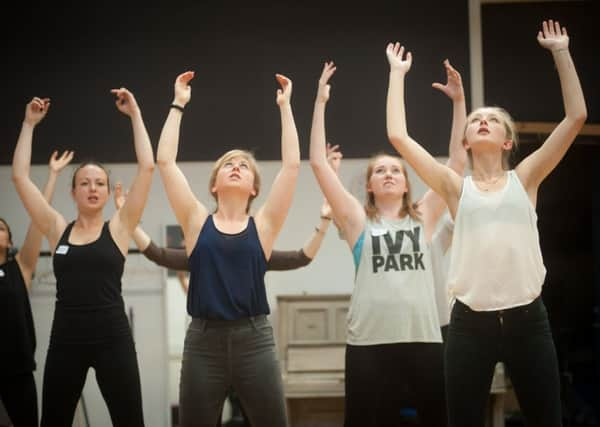Preview: The Suppliant Women at the Royal Lyceum


When the curtain rises next weekend on the first in-house show of the David Greig era at Edinburgh’s Royal Lyceum Theatre, the audience will be watching the result of one of those strange conjunctions that sometimes happen in the arts, between forces that, at first, could hardly seem more different. On one hand, there is the play, Aeschylus’s Suppliant Women; a knotty, difficult fragment almost two and a half thousand years old, the second oldest dramatic script in existence, and the opening part of a now lost trilogy about the arrival on the shores of Greece of a boatload of women from Egypt, asylum seekers fleeing the oppression of forced marriage.
And on the other, there is the working relationship between David Greig, in his role as playwright, and Ramin Gray, the artistic director of the touring company ATC London. The partnership began when Gray fell in love with the Greig scripts he read as an associate director at the Royal Court in the early 2000s,
Advertisement
Hide Adand came to fruition in their joint project The Events, premiered at the Traverse in 2013. Loosely based on the Anders Breivik killings in Norway, The Events features two professional actors working with a community choir in each town or city the play visits, to explore how choral music can express both a sense of community, and our horror at the violation of it.
And then there was the moment of collision, when a Swiss theatre director, watching The Events in London, noticed that Gray and Greig, together with music director John Browne, had created something very similar in form to ancient Greek drama – the chorus of ordinary citizens, the small group of professional actors, the alternation of choral comment and dialogue, and the drive to re-enact and understand recent traumatic public events. She suggested that Gray and Browne should work on The Suppliant Women, for a Swiss-German production in Bern; and when Greig was appointed as artistic director designate of the Lyceum, he knew immediately that a full English-language version of this play would be among his first projects.
“When we first began to look at this text, three years ago,” says Greig, “the refugee crisis hadn’t yet reached its height; the sense of its contemporary relevance is something that has grown much stronger, during that time. And I also think it’s striking how this ancient Greek play relates so closely to all the things I want to do with the Lyceum – the contribution to people’s sense of citizenship and democracy, the openness to music and poetry, the possibility of participation beyond the traditional performing professions, the shamanic element of collective ritual and renewal. For example, it’s thrilling to think that this text contains the very first mention of democracy that we have, anywhere in human literature.”
What’s perhaps even more remarkable about The Suppliant Women, though, is that unlike most other Greek tragedies, it has no central character apart from the chorus of women themselves, who are essentially the protagonists of the story, demanding their right to asylum, and to freedom of choice in marriage. In choosing this play, Greig has therefore taken the radical step of putting the leading role into the hands of a volunteer chorus of 30 young Edinburgh women who – with two professional actors playing their father Danaos and the Greek king Pelasgus – will carry the main pulse of the drama.
“Their level of commitment is really ferocious,” says Browne, whose music will include the sound of an ancient Greek instrument called the aulos, a double pipe whose sound has possibly not been heard in a theatre for two thousand years. “And that is because they are completely involved in our shared search for the meaning of what is actually a very complex, enigmatic piece of writing. My own inclination is never to make a classic play into a reconstruction, with authentic instruments and all of that. But in this case, I just found the sound of the aulos so earthy, raw and right that it seemed like the place to begin.”
And Greig and Gray are both clear that the use of a chorus of citizens is not primarily about saving money, but about something much more important – an increasingly urgent re-examination of the terms of engagement between professional theatre, and the community to which it is supposed to speak.
Advertisement
Hide Ad“It was one of our two pipers who reminded me that these plays were originally performed at something that was more like a Mod, or a Highland Games, than a modern theatrical premiere,” says Greig. “Over here would be the athletic events, and over there the play-writing competition, which Aeschylus won on many occasions. And the citizens who turned up for this festival would be fully engaged, not just as spectators, but as potential competitors, and as members or ex-members of the theatre chorus.
Gray agrees. “I think the coming of mass media has led to a professionalisation of entertainment that probably hasn’t been the norm through most of human history,” he says. “And this is clearly something live theatre can do, within communities – to bring those non-professional citizen voices back into performance, in a serious and thoughtful way. What I hope, in the end, is that through this coming-together of professional and citizen voices, this production will become a real, living encounter between a 21st century audience and Aeschylus’s play. I want to feel that if Aeschylus walked into the room, he would say, ‘Oh yes, that’s my play’. And I want the audience to want him to do that; to experience Aeschylus as a living playwright, so that when it’s over, they’ll want to discuss the show with him and with all of us who have created it.” ■
The Suppliant Women at the Royal Lyceum Theatre, Edinburgh, 1-15 October.